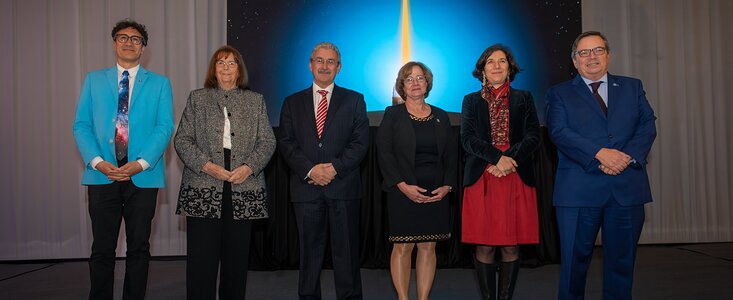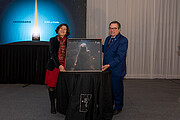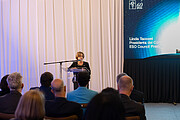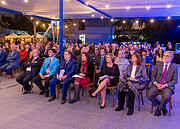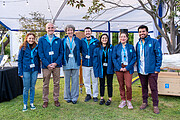Anuncio
ESO y Chile cumplen 60 años de colaboración en astronomía
12 de Octubre de 2023
El 6 de noviembre de 1963, la Observatorio Europeo Austral (ESO) y la República de Chile firmaron un acuerdo que dio lugar a una colaboración en astronomía que tendría un enorme impacto a nivel mundial. Esta relación permitió el establecimiento de observatorios únicos en el desierto de Atacama, como La Silla, Paranal y ALMA, como también el desarrollo de comunidades astronómicas sólidas y avances científicos de vanguardia.
Ayer, el personal y el Consejo de ESO, junto a diplomáticos de sus Estados Miembros, autoridades de Chile y la comunidad científica, asistieron a una ceremonia en las oficinas de ESO en Santiago, el primero de varios festejos en conmemoración de los 60 años del acuerdo.
La historia de Chile y ESO está marcada por diversos hitos que han consolidado esta cooperación. El primer observatorio establecido por ESO fue La Silla, inaugurado en 1969 en la región de Coquimbo, 600 Km al norte de Santiago. ESO actualmente opera allí algunos de los telescopios ópticos más productivos de su categoría. Además, hospeda proyectos internacionales que fomentan la colaboración, la investigación de alto nivel y la formación de nuevos profesionales.
En 1996, ESO y Chile firmaron un acuerdo suplementario en virtud del cual se otorgó tiempo de observación garantizado en los telescopios ESO a instituciones científicas chilenas. Además, se creó el Comité Mixto ESO-Chile, instancia que administra un fondo anual competitivo que contribuye al desarrollo de la astronomía, sus tecnologías conexas y a la divulgación a nivel nacional y regional en Chile.
En 1999, se inauguró el Observatorio Paranal, hogar del Very Large Telescope de ESO (VLT), en la región de Antofagasta en el norte de Chile. El VLT, que acaba de cumplir 25 años, es la instalación emblemática de ESO para la astronomía terrestre en esta era y ha llegado a ser el telescopio óptico más avanzado del mundo.
Hace diez años, se inauguró el Atacama Large Millimeter/submillimeter Array (ALMA), en el llano de Chajnantor a 50 km de San Pedro de Atacama. ALMA es el radiotelescopio más grande del mundo y es una cooperación astronómica global operada conjuntamente por ESO y sus socios internacionales de América del Norte y Asia del Este, en colaboración con la República de Chile. Este año ALMA cumple una década de operaciones científicas.
Estos observatorios generan una enorme cantidad de datos astronómicos, que han servido para llevar a cabo descubrimientos científicos fascinantes e incluso han redundado en varios premios Nobel.
Por otra parte, ESO actualmente construye el Extremely Large Telescope (ELT) en Cerro Armazones, cerca de Paranal. Con el inicio de sus operaciones científicas previsto para finales de esta década, será el telescopio óptico de mayor envergadura a nivel mundial y continuará profundizando los vínculos con Chile, a la vez que transforma nuestra comprensión del Universo.
La celebración de estos sesenta años de colaboración también incluirá eventos para las comunidades locales. El 4 de noviembre, la Fundación de Orquestas Juveniles e Infantiles de Chile (FOJI) estrenará una pieza musical compuesta en honor del Observatorio La Silla, en la ciudad de La Serena. Esto es consecuencia de la colaboración entre ESO y FOJI a lo largo de los últimos 12 meses, que ha incluido visitas de los músicos a los observatorios y encuentros entre músicos y personal de ESO.
Contactos
Francisco Rodriguez
ESO Chile Press Officer
Santiago, Chile
Email: francisco.rodriguez@eso.org
Bárbara Ferreira
ESO Media Manager
Garching bei München, Germany
Tel: +49 89 3200 6670
Email: press@eso.org
Sobre el anuncio
| Identificador: | ann23016 |
Our use of Cookies
We use cookies that are essential for accessing our websites and using our services. We also use cookies to analyse, measure and improve our websites’ performance, to enable content sharing via social media and to display media content hosted on third-party platforms.
ESO Cookies Policy
The European Organisation for Astronomical Research in the Southern Hemisphere (ESO) is the pre-eminent intergovernmental science and technology organisation in astronomy. It carries out an ambitious programme focused on the design, construction and operation of powerful ground-based observing facilities for astronomy.
This Cookies Policy is intended to provide clarity by outlining the cookies used on the ESO public websites, their functions, the options you have for controlling them, and the ways you can contact us for additional details.
What are cookies?
Cookies are small pieces of data stored on your device by websites you visit. They serve various purposes, such as remembering login credentials and preferences and enhance your browsing experience.
Categories of cookies we use
Essential cookies (always active): These cookies are strictly necessary for the proper functioning of our website. Without these cookies, the website cannot operate correctly, and certain services, such as logging in or accessing secure areas, may not be available; because they are essential for the website’s operation, they cannot be disabled.
Functional Cookies: These cookies enhance your browsing experience by enabling additional features and personalization, such as remembering your preferences and settings. While not strictly necessary for the website to function, they improve usability and convenience; these cookies are only placed if you provide your consent.
Analytics cookies: These cookies collect information about how visitors interact with our website, such as which pages are visited most often and how users navigate the site. This data helps us improve website performance, optimize content, and enhance the user experience; these cookies are only placed if you provide your consent. We use the following analytics cookies.
Matomo Cookies:
This website uses Matomo (formerly Piwik), an open source software which enables the statistical analysis of website visits. Matomo uses cookies (text files) which are saved on your computer and which allow us to analyze how you use our website. The website user information generated by the cookies will only be saved on the servers of our IT Department. We use this information to analyze www.eso.org visits and to prepare reports on website activities. These data will not be disclosed to third parties.
On behalf of ESO, Matomo will use this information for the purpose of evaluating your use of the website, compiling reports on website activity and providing other services relating to website activity and internet usage.
Matomo cookies settings:
Additional Third-party cookies on ESO websites: some of our pages display content from external providers, e.g. YouTube.
Such third-party services are outside of ESO control and may, at any time, change their terms of service, use of cookies, etc.
YouTube: Some videos on the ESO website are embedded from ESO’s official YouTube channel. We have enabled YouTube’s privacy-enhanced mode, meaning that no cookies are set unless the user actively clicks on the video to play it. Additionally, in this mode, YouTube does not store any personally identifiable cookie data for embedded video playbacks. For more details, please refer to YouTube’s embedding videos information page.
Cookies can also be classified based on the following elements.
Regarding the domain, there are:
- First-party cookies, set by the website you are currently visiting. They are stored by the same domain that you are browsing and are used to enhance your experience on that site;
- Third-party cookies, set by a domain other than the one you are currently visiting.
As for their duration, cookies can be:
- Browser-session cookies, which are deleted when the user closes the browser;
- Stored cookies, which stay on the user's device for a predetermined period of time.
How to manage cookies
Cookie settings: You can modify your cookie choices for the ESO webpages at any time by clicking on the link Cookie settings at the bottom of any page.
In your browser: If you wish to delete cookies or instruct your browser to delete or block cookies by default, please visit the help pages of your browser:
Please be aware that if you delete or decline cookies, certain functionalities of our website may be not be available and your browsing experience may be affected.
You can set most browsers to prevent any cookies being placed on your device, but you may then have to manually adjust some preferences every time you visit a site/page. And some services and functionalities may not work properly at all (e.g. profile logging-in, shop check out).
Updates to the ESO Cookies Policy
The ESO Cookies Policy may be subject to future updates, which will be made available on this page.
Additional information
For any queries related to cookies, please contact: pdprATesoDOTorg.
As ESO public webpages are managed by our Department of Communication, your questions will be dealt with the support of the said Department.
